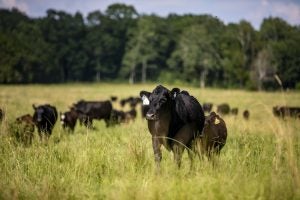Sometimes being around cattle — especially at a time like calving — gives me a lot of time to think. And it’s pretty easy to find myself getting lost in the swirl of negative current events and societal problems that seem to be everywhere. But then I try to think about my cows. There are reasons these animals bring me so much peace. Anyone who has spent a lot of time around cattle probably understands exactly what I mean.
Cows say so much through their mannerisms. Maybe we should take a few lessons from the cows and incorporate it in to our society. I don’t think it would hurt any.
Here are eight life lessons that really stood out to me:
1. The value of your herd
Cows are herd animals. They want — and need — to be with the herd. If they are not, chances are pretty good that something is wrong. Cattle are prey animals, so the herd instinct comes from years of survival. They know to stay with the crowd, unless something is wrong. Then they stand their ground.
2. Be a good babysitter
Cows are the best babysitters. There will be one cow with calves laying all around her while the other mommas are off eating or getting a drink. That cow will protect all of those babies. She doesn’t care that they’re not hers — she’s watching out for all of them while their moms are away. If you notice, it’s not always the same cow babysitting. They switch back and forth.
I was just reading an article about Tokyo and how their children travel solo around the city at a very young age. The youngest ones wear yellow hats, alerting the adults around that they may need a little help. They have decided that their young are their collective responsibility. They make it a safe place for those children to be because all of the adults are watching out for them. They step in when something is amiss. Everybody protects the children. Tokyo and cows have it figured out.
3. Be alert
Cattle’s senses, really most animals, are way more sensitive than ours. If cows say there’s a problem, there’s a problem. They can hear and see things much sooner than we can, so paying attention to what they are saying is vital.
4. What to avoid
By and large, cattle know what plants to avoid. Every once in a while you wonder if a cow ate something bad or there will be one with a tummy ache, but mostly, with all the options that cows have to eat, they know what plants to avoid. How? I’ve got millions of books accessible from my fingertips (not to mention the expanse of the internet), and I still don’t know which plants are poisonous and which aren’t.

5. The theory of 8,8,8
The eights. This one I could really get behind. Cattle spend roughly eight hours per day foraging, eight hours digesting, and eight hours sleeping. Tell me that schedule doesn’t sound like a dream!
6. Have watchful eyes
Whenever I’m moving cattle, I’m watching their eyes. They are constantly looking around, but settle on the path they’re going to take. If their eyeballs are focused on the gate, I let them go. If they’re focused somewhere else, I make sure to head them in the right direction. Most of my cows don’t like pressure. They like me to be at a distance on the four wheeler — little corrections go a long ways. Even revving the motor, just a little bit, will take them away from the sound.
7. Follow the feedtruck
They know their feed truck. It’s always incredible to me that cows know the pickups. My husband and I have very similar pickups — one is a year older, but everything else is the same. But the cows know that my pickup has the feed box and balebed, while his only has a balebed. How do they know that unless they come stick their nose where there should be feed and there’s none? Yet, they don’t have to do that. They just know.
8. Know their person
Depending on the time of year and how desperate they are to get places, my cows can sometimes be traitors, but a majority of the year, those cows come only to me. It’s taken years of rotational grazing and moving to transition them from how my husband and called them to how I call them. The oldest cows in the herd will still go to my husband, but the younger ones don’t. Don’t get me wrong, if they know there’s green grass, they’re going for anybody, but if they’re at all hesitant that it’s a trap, they are only coming for me or a feed truck they recognize.
Maybe these are true for all sorts of different livestock, but I’ve only ever been around cows. Society would be much better off if we had a community mindset around our young — they definitely have a mom, but there’s a whole community of helpers around that mom. If only we spent a little more time enjoying the eights — good food, good friends, and good rest — and a little less time worrying about the things that don’t matter. There’s a lot to be said if we put the good first and let our loyalty be known, if we worked toward a common goal, instead of constantly fighting.
Kelsey Pagel is a Kansas farmer. She grew up on a cow/calf and row crop operation and married into another. Kelsey and her Forever (Matt) farm and ranch with his family where they are living their dream and loving most of the moments.



